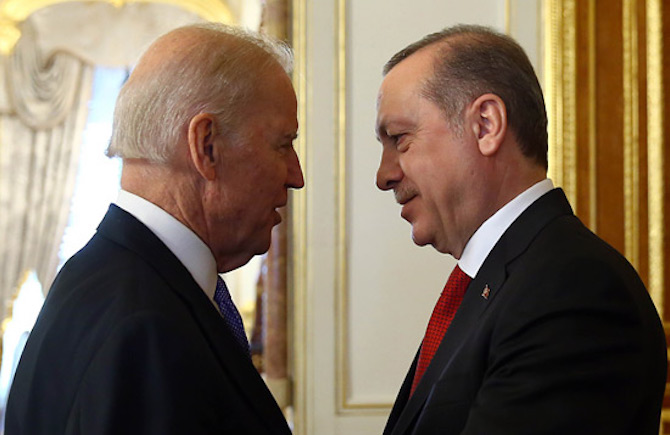Turkey’s Middle Eastern Reset
Batu Coşkun, LES /

Turkey’s foreign relations in recent years have been tumultuous to say the least. Deep bilateral disputes have persisted with Ankara’s traditional partners, such as the United States and the European Union, leaving Turkey to course a foreign policy approach that has largely been unilateral. This, coupled with Ankara’s no compromise security-based rationale, has left Turkey largely isolated in the Middle East as well. Though Turkey has realised her own agenda in Northern Syria and Libya, two areas of conflict that Turkish authorities have often deemed to possess existential repercussions, calculations in Turkey appear to be shifting. As Turkey solidifies gains on the ground, diplomacy seems to have been given a new lease of life in lieu of simple hard power.
This comes as Biden takes the helm at the White House, with the expectation that the Middle East will no longer be left to its own devices. As Washington supposedly gears for a more active role in the region, Turkey is slowly receding from its security-dominated thinking towards a more pragmatic approach. This pragmatism is manifest in Turkey’s recent drive to improve bilateral disputes with regional players, namely Saudi Arabia and Israel. A political will appears to emerged set on reversing some of the recent trends in Turkish foreign policy. An advisor to President Erdoğan had once called the situation Turkey finds itself in ‘precious isolation’. It would appear that this mindset is changing.
Reports in past weeks emerged on Turkish backchannel efforts with Israeli intelligence in order to overcome the impasses that persist in the bilateral relationship. Turkey had recalled its ambassador to Tel Aviv in 2018 over Israel’s continued settlement activities in the West Bank, and had similarly instructed the Israeli ambassador in Ankara to leave. Now there appears to be a drive to reach a mutual accommodation of sorts. While Israel and Turkey are quite unlikely to return to the cordial ties of the 1990s and the strategic links that such ties produced, a détente would still be marked as considerable progress. This would in turn translate into closer economic collaboration, namely in the area of the Eastern Mediterranean, as both Israel and Turkey have much to gain from the recent discoveries of energy resources in the area.
The most concrete step in this regard has come from Ankara, with an individual close to the president rumoured to have been selected for the ambassadorial post in Tel Aviv. President Erdoğan’s decision to appoint a close confidante signifies the Turkish government’s interest in improving ties with Israel, and that the matter has warranted the attention of the president himself. While Israel will likely expect more concrete steps from Turkey, such as limiting ties with Hamas, the two countries have recently shown that they can tacitly cooperate. Israel and Turkey, rather surprisingly, found themselves on the same side in the conflict in Nagorno Karabakh, paving the way for an Azerbaijani victory by jointly supplying arms to Baku against Armenia.
Another one of Turkey’s bilateral ‘resets’ is set to happen with Saudi Arabia. On the eve of the G-20 leaders’ summit, President Erdoğan and King Salman held a phone call for the first time in more than a year, and in the following weeks the Turkish foreign minister met his Saudi counterpart. The call came on the backdrop of an alleged informal boycott of Turkish imports entering the Kingdom, and Riyadh’s increasingly public criticism of Turkey’s regional agenda.
The relationship between Turkey and Saudi Arabia continues to persist under the shadow of journalist Jamal Khashoggi’s brutal murder in the Saudi consulate in Istanbul. While the Saudis have turned the page over the entire affair, emboldened by an oblivious President Trump, Turkey still seeks retribution by trying the perpetrators in absentia. Despite the entire Khashoggi debacle Turkey and Saudi Arabia are finding that cooperation better serves their interests, especially now since both countries are likely to find an unfriendly presence in the White House. With the Gulf crisis also having been resolved, Turkey and Saudi Arabia will likely have more room to cooperate in the near future.
Both countries are fearful of a more heavy-handed approach from Washington, which under Trump had simply allowed for regional actors to play out their aspirations. Turkey has much to lose in Northern Syria, where Biden might reverse Trump’s decision to vacate American forces in the area and might renew support for the YPG. Likewise, Saudi Arabia will face pressure in Yemen, as it continues to lead an increasingly controversial campaign against Iran-backed militias. In future, it would be unsurprising for Ankara and Riyadh to enlist support for one another’s agendas, if only to appear more formidable and united against the US.
Turkey’s pivot towards more friendly relations with neighbours is part of a wider discussion in Ankara, and indeed sign of a paradigm shift in foreign relations. Over the last four years, Turkey’s foreign policy thinking has been focused on security, seen in Ankara’s often unilateral interventions in the region. Think Syria, Libya and the Eastern Mediterranean, all points of conflict where Turkey has intervened in order to protect self-perceived non-negotiable interests. This has left the country in conflict with most of its regional neighbours, and increasingly unpopular in Western capitals.
Isolation, while often the price for such unilateralism, has become more and more costly for Ankara, which is seeking economic revitalisation. With the US having imposed sanctions on Ankara for the procurement of missiles from Russia, and the EU mulling sanctions over Turkey’s bid in the Eastern Mediterranean, Turkey finds that it needs partners to weather the imminent storm. Reaching a modus vivendi with Israel and Saudi Arabia would make great strides in this regard, and would make Turkey better geared for the post-Trump Middle East.
